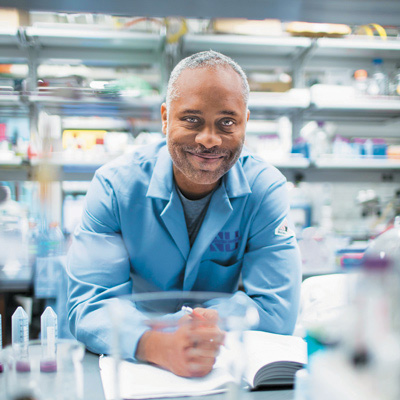Guillermo Ameer Awarded the Technology Innovation and Development Award
The honor recognizes biomaterials research that significantly benefits medical and surgical patients
Northwestern Engineering’s Guillermo A. Ameer, Daniel Hale Williams Professor of Biomedical Engineering at the McCormick School of Engineering and Surgery at the Feinberg School of Medicine, has been given the the 2022 Technology Innovation and Development Award by the Society For Biomaterials.

This award recognizes an individual’s (or a team’s) successful application of basic and applied biomaterials research in the development of a novel medical product or technology that significantly benefits the health and well-being of patients. Ameer’s laboratory is dedicated to the development of biomaterials and nanotechnology for regenerative engineering and medicine, specifically tissue engineering, medical devices, drug delivery, and cell delivery applications to improve surgery outcomes and patient care.
His laboratory is widely recognized for pioneering regenerative biomaterials based on a novel class of biodegradable polymers containing citrate and using them to regenerate a variety of tissues and organs. Citrate-based polymers were initially developed by Ameer’s team almost 20 years ago for applications in vascular and orthopedic tissue engineering. His research and patents are the foundation for CITREGEN, the core biomaterial technology used in new implantable medical devices developed by Acuitive Technologies Inc. and commercialized by Stryker Corporation for use in musculoskeletal surgeries. CITREGEN, the first thermoset biodegradable synthetic polymer ever used in implantable medical devices, contains unique chemical and mechanical properties that help grafted tissue heal.
“His research group at Northwestern University was the first to describe the synthesis of bioresorbable biomaterials that are based on citric acid,” wrote MIT professor Robert Langer. “These biomaterials are used for 3D printing medical devices such as stents, drug and protein delivery, and the regeneration several tissues including blood vessels, cartilage, bone, bladder, and skin. Ameer has co-authored numerous publications in high-impact journals, book chapters, patents, and conference proceedings and has received several awards for his researh.”
The director of Northwestern’s Center for Advanced Regenerative Engineering, which was awarded a T32 grant by the National Institutes of Health that was one of the first two T32 grants awarded in the field of regenerative engineering, Ameer was recently elected to the National Academy of Medicine; named Fellow of the Materials Research Society; inducted into the University of Texas McKetta Department of Chemical Engineering Academy of Distinguished Chemical Engineers; and awarded the Society for Biomaterials Clemson Award for Contributions to the Literature.
The Society For Biomaterials is a multidisciplinary society of academic, healthcare, governmental, and business professionals dedicated to promoting advancements in all aspects of biomaterial science, education, and professional standards to enhance human health and quality of life.
Read more about Guillermo A. Ameer

Ameer and Evan Scott, Kay Davis Professor and Associate Professor of Biomedical Engineering, have opened new paths to islet transplantation by using nanoparticles to deliver an immunosuppressive drug regimen, offering new hope for the treatment of Type 1 diabetes.
“This approach can be applied to other transplanted tissues and organs, opening up new research areas and options for patients,” Ameer said. “We are now working on taking these very exciting results one step closer to clinical use.”
Ameer and his work on novel biomaterials that are used in musculoskeletal surgeries to directly benefit patients were also profiled in the Fall 2021 issue of Northwestern Engineering.
“When I first started my lab years ago here at Northwestern, one of my major goals was to use engineering to have a positive impact on patient care,” Ameer said. “That goal has been a guiding principle for my research. I sought to work with surgeons to fully understand medical problems, patient needs, and constraints, and come up with solutions.”